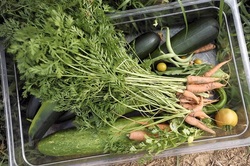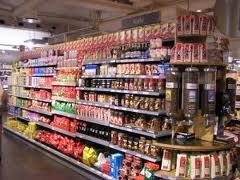 Upon reading the following article in the morning call a couple of weeks ago, I found it to be very informative for explaining what a co-op is and how it works. Since Savvy Shopper 4 U offers and is essentially like, a co-op, I wanted to share this article with you, my readers! Enjoy!! You've just dealt with rush-hour traffic on Route 22, or, perhaps you've just completed a public bus commute with a transfer at the Bethlehem transit center. Regardless, it's been a long day. You head into the kitchen to prepare dinner for your family. Halfway through the recipe, you realize you are out of one of the essential ingredients. How long does it take to get to the grocery store, purchase the item and return home? Chances are, if you live or work in downtown Bethlehem, you've experienced a moment of frustration like this at one point or another related to the lack of a nearby grocery store.It is exactly this sort of situation that sparked a movement to open a community-owned-and-operated grocery store, known as a food co-op, in Bethlehem. While the location of the store is still being determined, it will be within one of the city's two downtown areas — locales defined by the U.S. Census Bureau as "food deserts" or neighborhoods with low access to fresh food. The Bethlehem Food Co-Op will strengthen our community by improving the local economy, increasing the walkability of the city, and empowering residents.
Co-ops have been a successful business model since the 1840s, when a group of artisans in England got together to collectively purchase food and household items they could not afford on their own. They ran their business according to a set of cooperative principles. Since then, numerous waves of cooperative development have occurred under those same principles, growing from various social and political movements.
The Bethlehem Food Co-op is part of a solution to strengthen the economy in the greater Lehigh Valley region. Part of the co-op's mission is to support local food systems whenever possible. The store will build relationships with farmers and producers in the Valley, keeping food dollars circulating in our local economy and allowing lower prices to be passed on to shoppers.
According to Buy Fresh Buy Local, an organization that connects consumers to local farmers and producers, "If each of the 390,000 households in the Greater Lehigh Valley committed to spending just $10 per week on locally grown foods during the growing season, we would keep $109 million of our food dollars circulating here."
Clearly, a store committed to sourcing as much product as possible from local vendors would have an enormous positive impact on the local economy. Additionally, the co-op plans to provide quality employment opportunities by offering fair wages, comprehensive benefits, and the chance for employees to have a strong voice in the business.
Another benefit residents can look forward to with the opening of the Bethlehem Food Co-Op is the increased walkability of their neighborhoods. Aside from the obvious convenience of being able to purchase basic groceries and household items without driving across town, research suggests that neighborhoods and cities that are considered walkable have stronger economies than those that require residents to drive.
"Real estate values increase as neighborhoods became more walkable, where everyday needs, including working, can be met by walking, transit or biking," according to Christopher B. Leinberger, professor at The George Washington University School of Business and a senior fellow at the Brookings Institution. Leinberger found that average household incomes can increase by up to $10,000 in walkable neighborhoods.
One of the most valuable things the co-op will offer to its neighbors is a chance for empowerment. While the store will be open to any member of the public, households that choose to invest a small amount of equity in the co-op become member-owners, meaning they have an equal voice in decisions regarding the business and are encouraged to run for the board and take on other leadership positions. The Bethlehem Food Co-Op will be more than just a store; it will serve as a community gathering space, a center for education and informed consumerism, and a forum for neighbors to build relationships and have their voices heard. The co-op will be a source of pride for its members and the city as a whole, bringing the spirit of the Lehigh Valley into the spotlight. (Morning Call newspaper, October 29, 2013, written by Colleen Marsh, http://articles.mcall.com/2013-10-29/opinion/mc-bethlehem-food-co-op-marsh-yv-20131029_1_grocery-store-local-economy-food-dollars)
 1. Buy nothing. Many times, not buying anything at all will save you more than buying something on sale.
2. Consider all your options. Instead of purchasing something could you make it, get it used, fix something you already own, or do without? Could you use a less expensive alternative or a generic or house brand item?
3. Know what you want. Write things down while you're at home, where you'll most likely be using most of your purchases.
4. Research larger purchases. You don't have to study every loaf of bread, but if you're thinking of buying an appliance, an automobile, a computer, etc., it can be well worth your time to familiarize yourself.
5. Keep a list. If it's more than two items, write them down.
Writing things down while you're at home helps you not to forget them when you're at the store, thus saving you trips, time and money. This is especially true for day-to-day purchases.
Lists of larger purchases or potential can help you to distinguish between needs and wants, and to consider larger purchases more carefully before buying them.
A list can be a good place to leave things you're still considering. You may learn more about a particular item or decide you don't need it later on.
6. Know what a good price is.
For items that you buy routinely, such as groceries, watch the advertisements and know what good prices are and what very low sale prices are. You can keep a notebook with prices at different stores if it helps.
For items you purchase less frequently, do a price comparison. Call or shop around to a few different stores. Look online, too, but don't forget to figure in the extra costs of shipping and taxes.
7. Stick to the list. Stores go out of their way to put the basic items in the back so that you have to wander past prominently placed, colorful bargains. If you didn't need junk food, colorful sandals, or an extra 100-foot extension cord when you were at home, you don't need it in the store.
8. Stock up, but be selective about what you stock up on. Bulk pricing can get you a good deal, but if you end up with 25 pounds of flour and you never bake, it's not really a good deal. Buy in bulk if you use it, if it will last long enough for you to use it, if you have the space to store it, and if the price is really better than you'd get buying a more moderate quantity.
9. Consider bargains carefully. Is it really a good deal, or is somebody trying to up sell you or persuade you to buy something you don't need?
10. Learn to recognize a sales pitch and resist it.
11. Spend cash. Seeing yourself Part Company with your money, and parting company only with money you have, can often remind you to spend less. It can certainly help you keep from overextending yourself.
12. Think through the lifetime of your purchase. Will this purchase become clutter? Will you be able to go on using it for a long time? Can you do without it for now?
13. Remember that not all purchases are objects. A restaurant meal, a gym membership, and a monthly cell phone bill are all purchases you should evaluate carefully. Scrutinize anything with a monthly bill or monthly payment with special care, since a few dollars a month can quickly turn into many dollars per year.
14. Figure in all costs when considering a purchase. Include taxes, subscriptions, shipping, upkeep, and your own time to use or set up whatever you are purchasing.
15.Ask for a better price. Not all prices are negotiable, but it doesn't cost you anything to ask. Simply asking "Is this the best price you can offer?" can often bring the price down, but depending on the situation, you may want to haggle a bit.
 Doesn’t “unused inventory” mean expired or cast-off?
“Cast-off” is the wrong idea. The products just weren’t selling, so the remarketer moved them elsewhere to find a customer. These products are typically the very same name-brand goods you would buy anywhere else and they’re just as safe as they would be elsewhere. As proof, many outlets offer a money-backed quality and satisfaction guarantee.
As part of that guarantee, the outlets also take great care to explain that their goods are not expired. Before you visit an outlet for the first time, I’d recommend visiting its website to learn more about product packaging and “best use” dates.
Basically, a “sell by” date should be followed for safety reasons, but labels like “best if used by” and “use by” dates on packaging are not related to product safety and are just a manufacturer’s recommendation for peak flavor quality.
Outlets may still sell goods after these ‘best use” dates as long as they judge the goods to still be safe.
Buyer beware, of course, but I shop at grocery outlets all the time and I’ve never been disappointed by the quality I’ve found. (Don’t forget the outlet guarantee, either.)
What other things you should know about grocery outlets? Many of them still accept manufacturer’s coupons, which will save you even more money at the checkout. Also, heads-up: many outlets try to keep their costs low by avoiding credit card fees and thus, many outlets don’t accept credit cards.
As the saying goes, cash is king, and now you know how you can save a lot of it just by shifting your shopping to grocery outlets.
BY: Sydney Jarod is a freelance journalist in northern California
|



 RSS Feed
RSS Feed